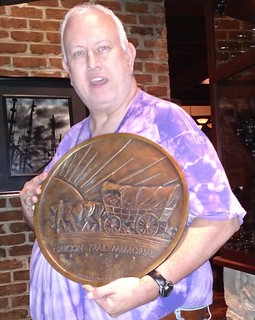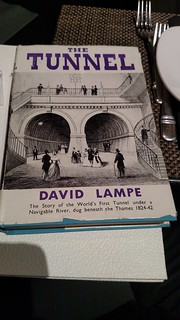
PREV ARTICLE
NEXT ARTICLE
FULL ISSUE
PREV FULL ISSUE
WAYNE'S NUMISMATIC DIARY: NOVEMBER 15, 2015Tuesday night, November 10, 2015 was the monthly meeting of my Northern Virginia numismatic social group, Nummis Nova. Roger Burdette was our host. We met at J. Gilbert's, a steakhouse in McLean, VA. My GPS took me on an adventurous route, down a few roads I've never before been on or even heard of. But it got me there in plenty of time; in fact, I was about an hour early. So after calling my wife, I went inside, took a seat at the bar, and ordered a drink. Luckily, Eric Schena was early as well and soon joined me. We chatted for a while then went to our table along with Wayne Herndon. We were in a nice cozy alcove, separated from the main dining area. Joining us before long were Joe Esposito, Steve Bishop, Jon Radel and Roger, who sat near me and Eric. The rest of the table soon filled up with regulars Gene Brandenburg, Dave Schenkman, Joe Levine, Julian Leidman, and Mike Packard. 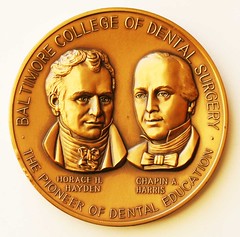 
Roger had the pleasure of enduring a root canal that afternoon, so he'd declared the evening's theme to be dentistry. The only one to bring something related to the theme was Dave Schenkman, who had this Baltimore College of Dental Surgery medal. 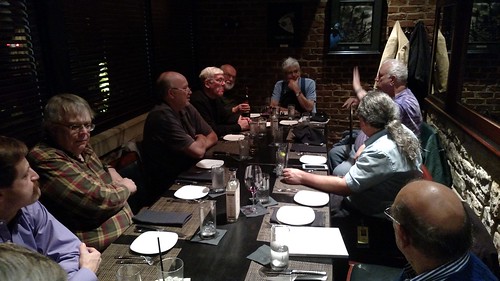
Wayne Herndon, Jon, Mike, Dave, Gene, Julian, Steve, Eric, Joe Esposito Photo by Wayne Homren 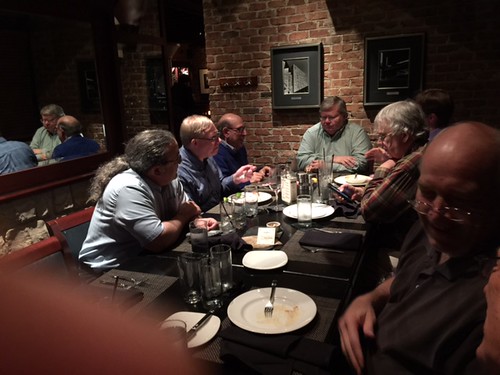
Eric, Wayne, Joe Esposito, Roger, Wayne Herndon, Jon, Mike Photo by Gene Brandenburg 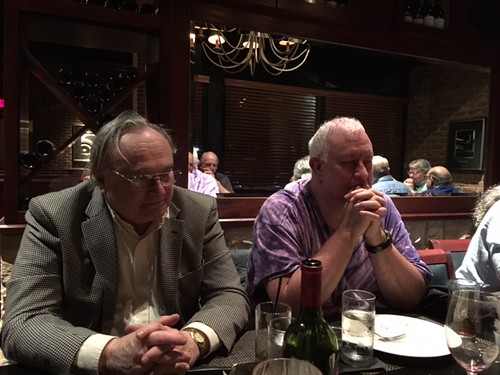
Joe Levine, Steve Bishop. Photo by Gene Brandenburg Mentoring Not-So-Young-Anymore-Numismatists
We agreed that it should not be explicitly tied to Nummis Nova, since not everyone would be involved but mostly because the group is explicitly designed to be a purely social group with no committees, responsibilities, or structure. While several of us might end up mentoring or otherwise participating, it would be done on an individual basis. We'll get started after the regular December Annandale coin show kids meeting, where Joe Esposito has already volunteered to be a speaker. Thanks! What Is a Collector?
We agreed that there's a "collecting gene" - that either you have it or you don't. Some people are just born to be collectors. And collectors often collect more than one thing. While all of us in our group are coin collectors, we have other collections too, from antiques to books to banjos. While spouses and friends might also purchase and accumulate similar items, they just don't have the same drive as a collector. They may see something pretty or interesting and decide to acquire it. But a collector is driven seek out their quarry, and will go to great lengths to find it. Wayne mentioned one customer who is working on birth year coin sets - not just or his own birth year, but those of his wife, their kids, parents, grandparents etc., back five generations. What a great idea! He comes to every show armed with checklists and returns home with new purchases. Collectors are driven by the urge for completeness, but there's more to it than that. I noted somewhat sheepishly that I'd never been so driven to actually complete any collection I'd started. My first collection, of Lincoln cents, still lacks four key dates. As an adult I could have purchased those coins anytime, but I moved my sights to other prizes. I worked for years acquiring U.S. Encased Postage Stamps and again ran out of money and time to complete it before deciding to sell. So while completeness is a goal, it's not the key factor. My journey is a common one. Many collectors are serial collectors - they work on assembling one collection, then move on to another collection even if they haven't finished the first. So it's not the destination - it's the journey. Collectors are driven by the quest. The joy is in the seeking and finding, not the having. Wayne noted that as a dealer, the hardest things to sell are, paradoxically, complete sets. Why? Because where's the fun in that? Collectors like the concept of a complete collection, but their focus is on the HOLES. What they have is nice, but what drives them is DON'T HAVE YET. Transit Company Token Hub
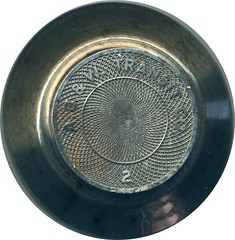
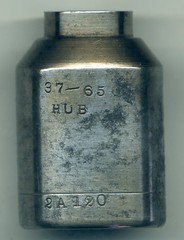
Eric Schena brought a rare and interesting item. He writes: I have a penchant for dies used to strike tokens from the Mid-Atlantic region and have a fair number of them. My most recent acquisition is an unusual one: a hub for a transportation token. Most trade tokens were struck in small enough quantities that usually one or two die pairs were sufficient to produce the entire run. Transportation tokens were sometimes made in larger quantities so a hub may make some sense. This hub was used to produce the dies used for Atwood-Coffee VA 20-L and 20-M for the Alexandria Barcroft & Washington Transit Company in the late 1950s. This is the first and only token hub I've run across and is doubly appealing for me since it's for a local company. Mining Company Notes
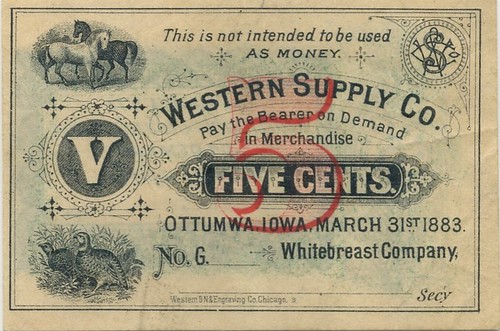
Dave writes: Western Supply Company was the company store for Whitebreast Coal & Mining Company. The company also issued bimetallic tokens. 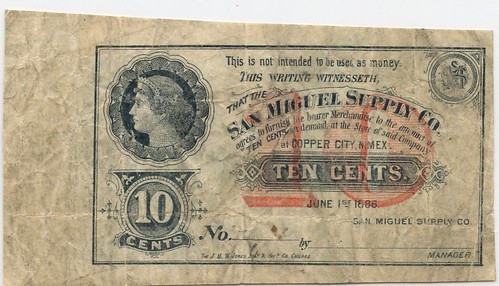
Dave writes: San Miguel Supply Company was the company store for San Miguel Mining Company, a copper mining operation. I didn’t know the note existed until this one was offered by Heritage. 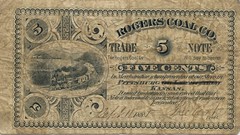
Dave adds: The third note I purchased from Heritage’s most recent sale of the Eric Newman collection is this one, issued by the Rogers Coal Company of Pittsburg, Kansas. Only a few Kansas coal companies are known to have issued notes. All are rare with one exception; the notes from Miller Brothers & Company of Mulberry. A five cents denomination is listed in Steve Whitfield’s catalog, Kansas Paper Money, with the notation that it is unique. In obsolete paper money, as with tokens, unique can be a transient quality. In this case, a hoard of about 140 of the notes, including five and ten cents denominations, surfaced three or four years ago. The owner is bleeding them out, and occasionally one will appear on eBay. The last Heritage sale offered a ten cents in “gem uncirculated 65 EPQ” condition, and it brought $705, which is several times what a note with seventy pieces known should be worth. Oregon Trail Plaque
At our part of the table tropics ranged from last week’s Baltimore show to a huge Oregon Trail plaque Steve Bishop had just purchased; neat item but it appears to be a recast. As I recall, originals are 16½” and this one was 16”. Another topic that comes to mind was an 1855 California Gold $1 coin of mine that Gene had slabbed for me. Steve's returning the plaque to the seller. It's a very nice item regardless, but not at the high price of an original.
Thames Tunnel Medals
We weren't going to take a train or bus to the other side of the river - we were going to walk - UNDER it. On opposite banks of the river stood two cylindrical domed structures. These were the entrances of a pedestrian tunnel (the Greenwich Foot Tunnel), built beneath the Thames in 1902. Each of the structures houses a spiral staircase and a lift (elevator). We walked down the stairs on the north bank and rode the lift up on the south bank, emerging near the Greenwich dock and the Cutty Sark. But Joe's book and medals weren’t about this tunnel; instead, they related to a much earlier one, the Thames Tunnel. From Wikipedia: The Thames Tunnel is an underwater tunnel, built beneath the River Thames in London, connecting Rotherhithe and Wapping. It measures 35 feet (11 m) wide by 20 feet (6 m) high and is 1,300 feet (396 m) long, running at a depth of 75 feet (23 m) below the river surface measured at high tide. It was the first tunnel known to have been constructed successfully underneath a navigable river, and was built between 1825 and 1843 using Marc Isambard Brunel's and Thomas Cochrane's newly invented tunnelling shield technology, by Brunel and his son Isambard Kingdom Brunel. The tunnel was originally designed for, but never used by, horse-drawn carriages. It now forms part of the London Overground railway network under ownership of Transport for London. To read the complete article, see:
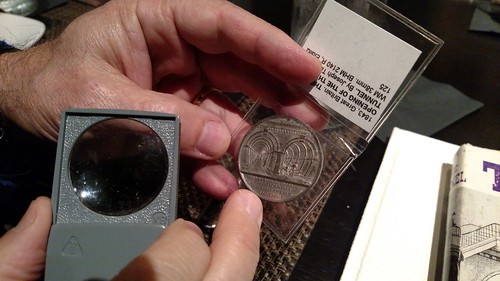
Wayne Homren examining Joe Esposito's Thames Tunnel Medals Nummis Nova is a delight. It was another great night of numismatic fellowship. 'Til next time. 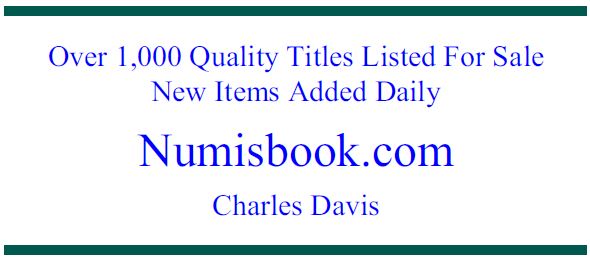
Wayne Homren, Editor The Numismatic Bibliomania Society is a non-profit organization promoting numismatic literature. See our web site at coinbooks.org. To submit items for publication in The E-Sylum, write to the Editor at this address: whomren@gmail.com To subscribe go to: https://my.binhost.com/lists/listinfo/esylum All Rights Reserved. NBS Home Page Contact the NBS webmaster 
|
